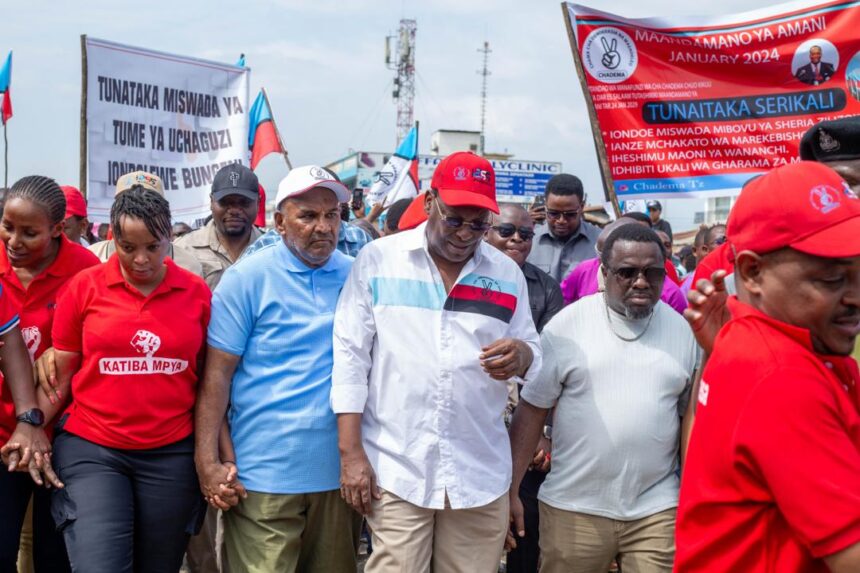CHADEMA, the party often referred to as the main opposition party in Tanzania, presents itself as the party with solutions to the problems facing Tanzanians, which the ruling party CCM has failed to address in over 60 years since independence.
There are challenges in education, healthcare, infrastructure, water, and electricity. Despite all the efforts by successive CCM governments to try to solve them, it is clear that most Tanzanians still face significant challenges in these areas. Therefore, CHADEMA, as a political party, has a political responsibility to ensure that they present alternative policies to Tanzanians to seek their mandate to take power and address these issues affecting over 60 million Tanzanians.
So, what strategies is CHADEMA using to ensure they gain the trust of Tanzanians to assume power in the upcoming elections? And can these strategies bring about the desired results?
CHADEMA has been using public rallies and demonstrations in various regions across the country to convey their message to the government and the general public about the challenges facing Tanzanians. CHADEMA has already held protests in Dar es Salaam and Mwanza, and tomorrow, February 20th, they plan to hold protests in the city of Mbeya.
However, let’s ask ourselves, what changes have the protests in Dar es Salaam and that Mwanza brought about? Among the demands or grievances CHADEMA is putting forward are:
- The government should lower the prices of essential goods and ease the cost of living.
- The government should withdraw flawed bills.
- The government should amend the constitution and laws for free and fair elections.
- The government should continue the process of drafting a new constitution;
- and listen to and respect the opinions of the citizens.
The question is, out of all these demands, have any, even to a small extent, been met or addressed by the government due to CHADEMA’s protests in Dar es Salaam and Mwanza?
Looking at the first request, the living conditions for Tanzanians are still not good. The prices of essential goods such as food and fuel are still high, and according to reports from the Central Bank, ongoing global conflicts and climate change are among the reasons contributing to these challenges. Therefore, the quality of life for Tanzanians is still difficult despite the protests.
The second demand, for the withdrawal of bills, has already been passed by parliament, and all that remains is for President Samia Suluhu to sign them into law. In the history of Tanzanian politics, it is very rare for a bill to reach the president and not be signed, as it would be sent back to parliament for amendments. Therefore, it is clear that the president will sign these bills, rendering CHADEMA’s second demand ineffective despite their protests.
The government of President Samia Suluhu acknowledges the importance of a new constitution but has repeatedly stated that the constitution is not a priority as the nation has many other pressing matters that directly affect the lives of Tanzanians. CHADEMA’s protests lack the strength or pressure to compel the government of President Samia to amend the laws to allow the process of drafting a new constitution to begin, especially at this time, as we approach the 2024 local government elections and the 2025 General Election.
It is evident that CHADEMA’s protest schedule will conclude without any of its demands being met. Nevertheless, CHADEMA will have effectively communicated a significant message to both the government and the Tanzanian populace through these protests. However, should the government fail to address any of CHADEMA’s demands, one might argue that the efficacy of organizing demonstrations by CHADEMA comes into question.
On social media, various opinions from supporters of parties outside of CHADEMA have stated that CHADEMA’s opinion is not the opinion of all Tanzanians; therefore, for CHADEMA to claim their opinions represent the opinions of all Tanzanians is incorrect. Additionally, some have said that the low turnout of CHADEMA protests in Dar es Salaam and Mwanza is due to the fact that CHADEMA’s protests do not come with alternative policies and strategies against those of CCM to solve Tanzanians’ problems, but rather they come with criticisms and ridicule, so Tanzanians end up not seeing any change.


